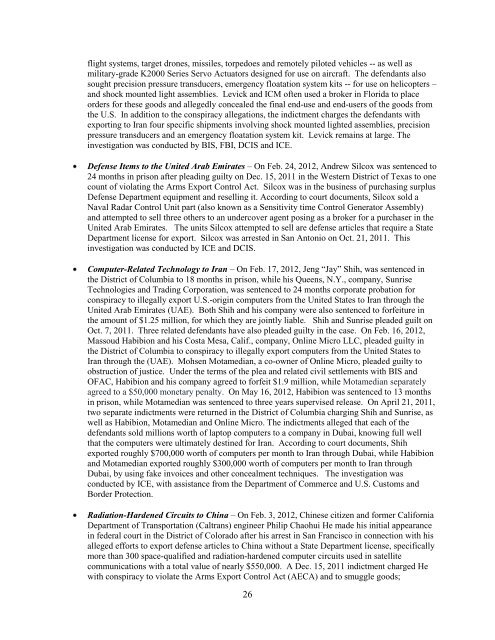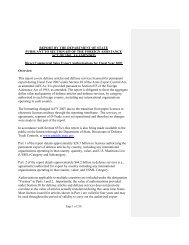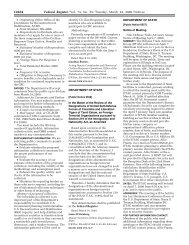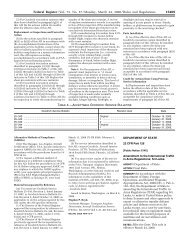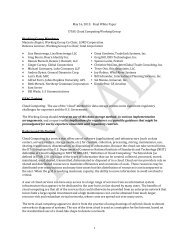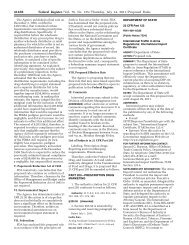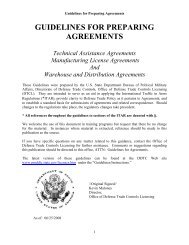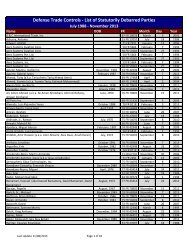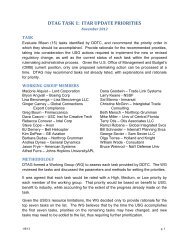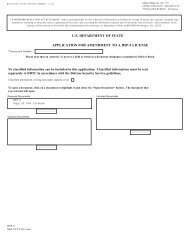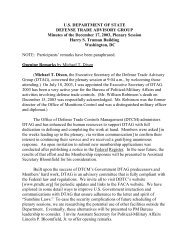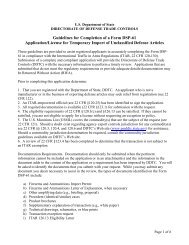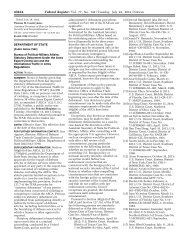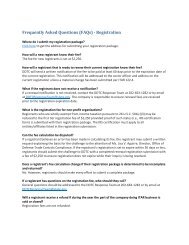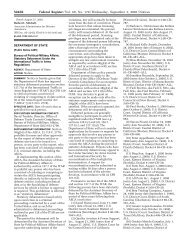Major Export Enforcement Cases - Directorate of Defense Trade ...
Major Export Enforcement Cases - Directorate of Defense Trade ...
Major Export Enforcement Cases - Directorate of Defense Trade ...
You also want an ePaper? Increase the reach of your titles
YUMPU automatically turns print PDFs into web optimized ePapers that Google loves.
flight systems, target drones, missiles, torpedoes and remotely piloted vehicles -- as well as<br />
military-grade K2000 Series Servo Actuators designed for use on aircraft. The defendants also<br />
sought precision pressure transducers, emergency floatation system kits -- for use on helicopters –<br />
and shock mounted light assemblies. Levick and ICM <strong>of</strong>ten used a broker in Florida to place<br />
orders for these goods and allegedly concealed the final end-use and end-users <strong>of</strong> the goods from<br />
the U.S. In addition to the conspiracy allegations, the indictment charges the defendants with<br />
exporting to Iran four specific shipments involving shock mounted lighted assemblies, precision<br />
pressure transducers and an emergency floatation system kit. Levick remains at large. The<br />
investigation was conducted by BIS, FBI, DCIS and ICE.<br />
<strong>Defense</strong> Items to the United Arab Emirates – On Feb. 24, 2012, Andrew Silcox was sentenced to<br />
24 months in prison after pleading guilty on Dec. 15, 2011 in the Western District <strong>of</strong> Texas to one<br />
count <strong>of</strong> violating the Arms <strong>Export</strong> Control Act. Silcox was in the business <strong>of</strong> purchasing surplus<br />
<strong>Defense</strong> Department equipment and reselling it. According to court documents, Silcox sold a<br />
Naval Radar Control Unit part (also known as a Sensitivity time Control Generator Assembly)<br />
and attempted to sell three others to an undercover agent posing as a broker for a purchaser in the<br />
United Arab Emirates. The units Silcox attempted to sell are defense articles that require a State<br />
Department license for export. Silcox was arrested in San Antonio on Oct. 21, 2011. This<br />
investigation was conducted by ICE and DCIS.<br />
Computer-Related Technology to Iran – On Feb. 17, 2012, Jeng “Jay” Shih, was sentenced in<br />
the District <strong>of</strong> Columbia to 18 months in prison, while his Queens, N.Y., company, Sunrise<br />
Technologies and Trading Corporation, was sentenced to 24 months corporate probation for<br />
conspiracy to illegally export U.S.-origin computers from the United States to Iran through the<br />
United Arab Emirates (UAE). Both Shih and his company were also sentenced to forfeiture in<br />
the amount <strong>of</strong> $1.25 million, for which they are jointly liable. Shih and Sunrise pleaded guilt on<br />
Oct. 7, 2011. Three related defendants have also pleaded guilty in the case. On Feb. 16, 2012,<br />
Massoud Habibion and his Costa Mesa, Calif., company, Online Micro LLC, pleaded guilty in<br />
the District <strong>of</strong> Columbia to conspiracy to illegally export computers from the United States to<br />
Iran through the (UAE). Mohsen Motamedian, a co-owner <strong>of</strong> Online Micro, pleaded guilty to<br />
obstruction <strong>of</strong> justice. Under the terms <strong>of</strong> the plea and related civil settlements with BIS and<br />
OFAC, Habibion and his company agreed to forfeit $1.9 million, while Motamedian separately<br />
agreed to a $50,000 monetary penalty. On May 16, 2012, Habibion was sentenced to 13 months<br />
in prison, while Motamedian was sentenced to three years supervised release. On April 21, 2011,<br />
two separate indictments were returned in the District <strong>of</strong> Columbia charging Shih and Sunrise, as<br />
well as Habibion, Motamedian and Online Micro. The indictments alleged that each <strong>of</strong> the<br />
defendants sold millions worth <strong>of</strong> laptop computers to a company in Dubai, knowing full well<br />
that the computers were ultimately destined for Iran. According to court documents, Shih<br />
exported roughly $700,000 worth <strong>of</strong> computers per month to Iran through Dubai, while Habibion<br />
and Motamedian exported roughly $300,000 worth <strong>of</strong> computers per month to Iran through<br />
Dubai, by using fake invoices and other concealment techniques. The investigation was<br />
conducted by ICE, with assistance from the Department <strong>of</strong> Commerce and U.S. Customs and<br />
Border Protection.<br />
Radiation-Hardened Circuits to China – On Feb. 3, 2012, Chinese citizen and former California<br />
Department <strong>of</strong> Transportation (Caltrans) engineer Philip Chaohui He made his initial appearance<br />
in federal court in the District <strong>of</strong> Colorado after his arrest in San Francisco in connection with his<br />
alleged efforts to export defense articles to China without a State Department license, specifically<br />
more than 300 space-qualified and radiation-hardened computer circuits used in satellite<br />
communications with a total value <strong>of</strong> nearly $550,000. A Dec. 15, 2011 indictment charged He<br />
with conspiracy to violate the Arms <strong>Export</strong> Control Act (AECA) and to smuggle goods;<br />
26


